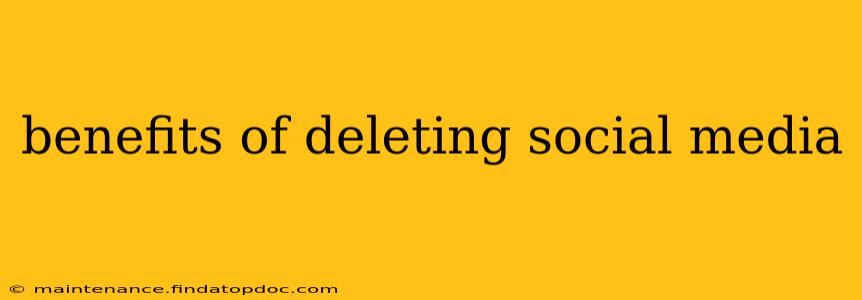The Unexpected Benefits of Deleting Social Media: Reclaiming Your Time and Wellbeing
In today's hyper-connected world, social media has become almost ubiquitous. But what happens when we disconnect? Stepping away from the constant stream of updates, likes, and notifications can unlock a surprising array of benefits for your mental health, productivity, and overall wellbeing. This isn't about demonizing social media; it's about understanding its impact and making conscious choices about your digital consumption.
Why are you considering deleting social media? This is a crucial first step. Are you feeling overwhelmed, stressed, or constantly comparing yourself to others? Do you find yourself spending hours scrolling without realizing it? Identifying your reasons for wanting to quit is the first step towards a successful digital detox.
1. Reduced Stress and Anxiety:
Social media often presents a curated, unrealistic view of others' lives. This constant exposure can fuel feelings of inadequacy, envy, and anxiety. Deleting social media removes this pressure, allowing you to focus on your own life and achievements without the constant comparison. Studies have linked heavy social media use to increased anxiety and depression, so disconnecting can be a significant step towards improved mental health.
2. Improved Sleep Quality:
The blue light emitted from screens interferes with melatonin production, making it harder to fall asleep. The constant notifications and the addictive nature of social media can also disrupt sleep patterns, leading to fatigue and reduced cognitive function. Deleting social media can dramatically improve your sleep quality, leaving you feeling more rested and energized throughout the day.
3. Increased Productivity and Focus:
Scrolling through social media can be a massive time-waster. Deleting these apps frees up significant time that can be redirected to more productive activities, like work, hobbies, or spending quality time with loved ones. The reduced distractions also lead to improved concentration and focus on tasks at hand.
4. Enhanced Self-Esteem and Body Image:
Social media often promotes unrealistic beauty standards and body image ideals. Constantly being exposed to these images can negatively impact self-esteem and body image, particularly among young people. Deleting social media can create space for a healthier and more positive self-perception, unburdened by the pressure of external validation.
5. More Time for Real-Life Connections:
Ironically, deleting social media can strengthen your real-life relationships. Instead of passively engaging with online connections, you'll have more time and energy to nurture meaningful relationships with friends and family through face-to-face interactions and shared experiences.
6. Reduced Fear of Missing Out (FOMO):
FOMO is a common side effect of constant social media use. The feeling of missing out on events or experiences can be overwhelming. Deleting social media significantly reduces this anxiety, allowing you to focus on the present moment and appreciate your own experiences without the constant pressure of comparison.
7. Improved Mental Clarity and Mindfulness:
The constant stream of information and notifications on social media can lead to mental clutter and decreased mindfulness. Disconnecting allows for mental space, promoting clarity and the ability to focus on the present moment. This can lead to a greater sense of peace and improved overall wellbeing.
8. Protection from Cyberbullying and Negative Content:
Social media can be a breeding ground for cyberbullying and exposure to harmful or negative content. Deleting these platforms offers protection from this negativity, creating a safer and more positive online environment.
How to Successfully Delete Social Media:
- Identify your reasons: Understanding why you want to quit is crucial for staying motivated.
- Set realistic goals: You don't have to delete everything at once. Start by deleting the apps you find most addictive.
- Find alternative activities: Replace the time spent on social media with healthier activities, such as reading, exercising, or spending time in nature.
- Be prepared for withdrawal: You may experience withdrawal symptoms initially, such as cravings or feelings of loneliness. Be patient and kind to yourself.
- Consider alternatives: If you need to stay connected with friends and family, consider using alternative communication methods, such as email or text messaging.
Deleting social media might seem daunting, but the potential benefits for your mental and emotional health are significant. By reclaiming your time and attention, you can create space for more meaningful connections, increased productivity, and a greater sense of wellbeing. It's a decision that could profoundly improve your life.
